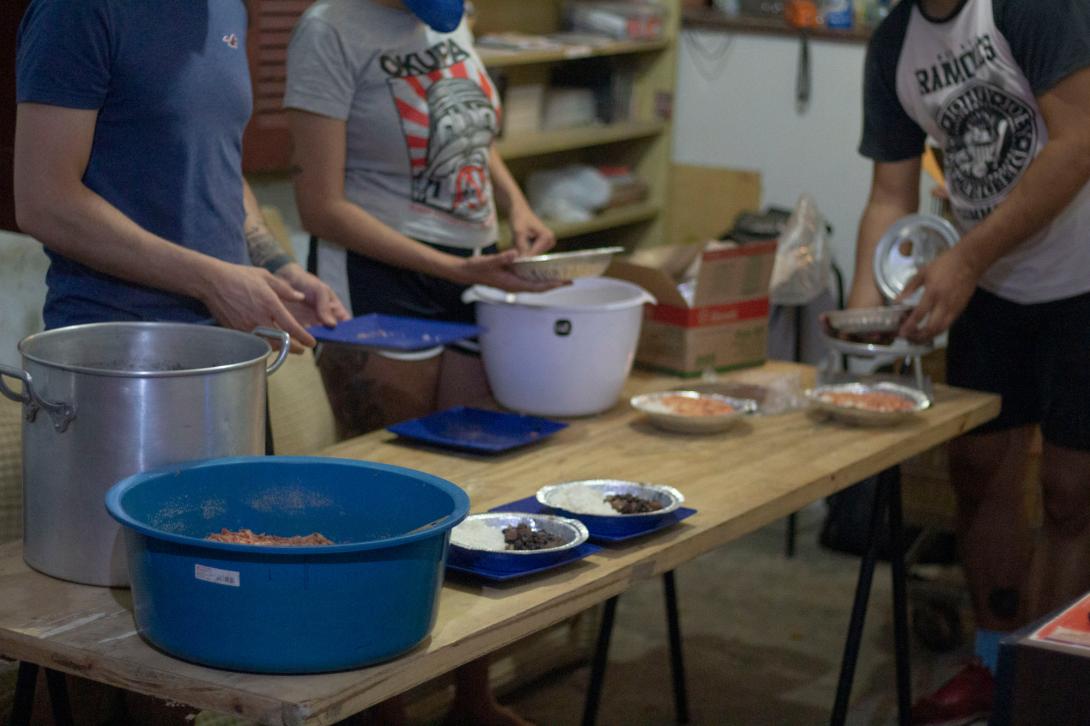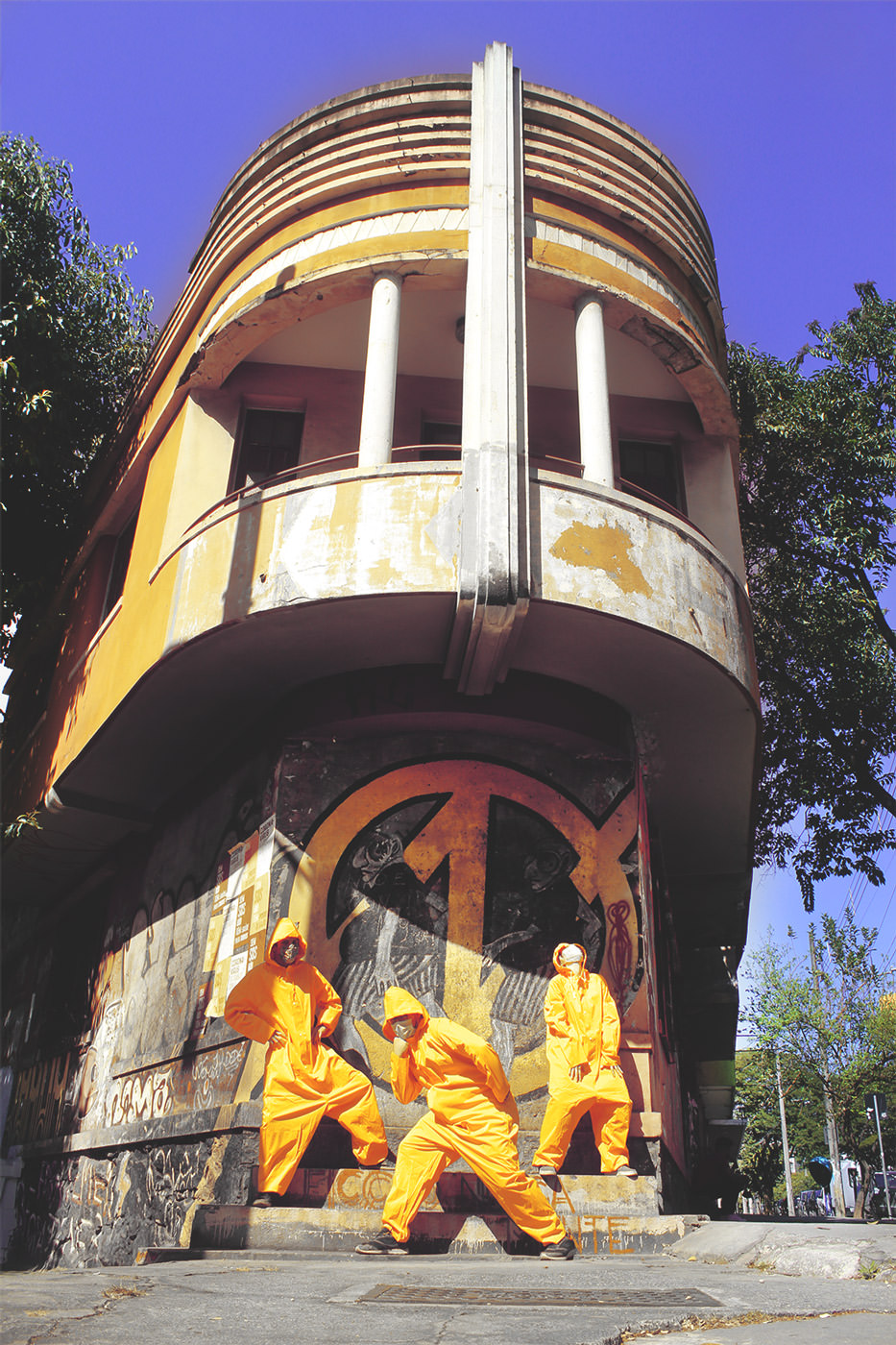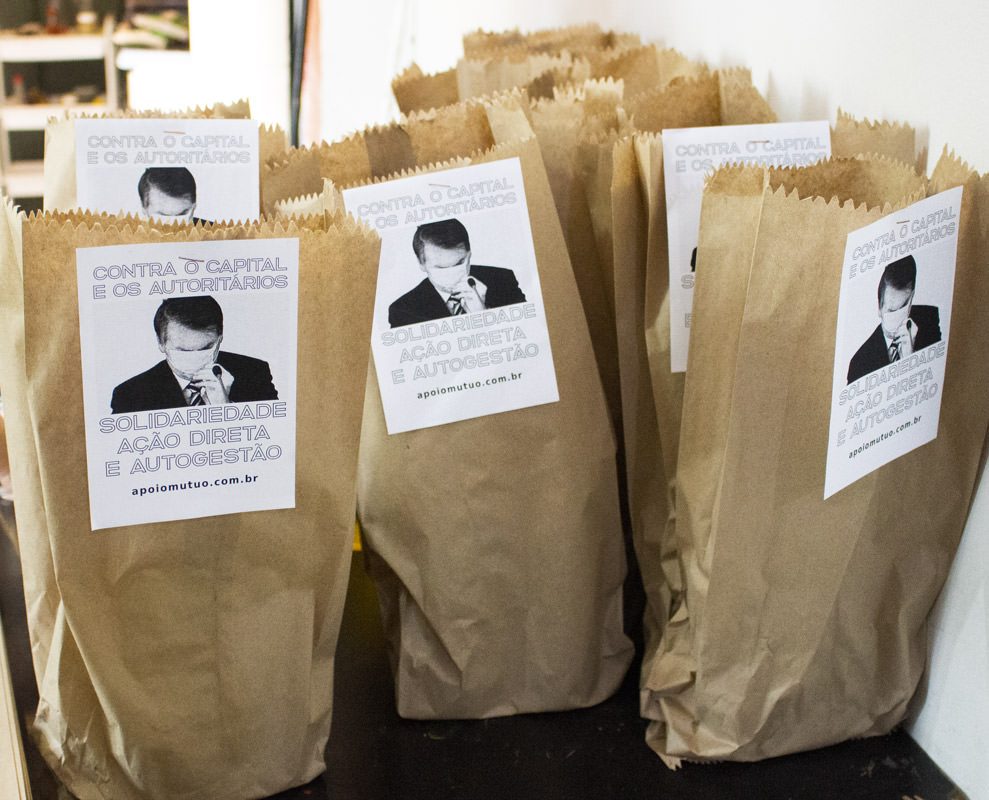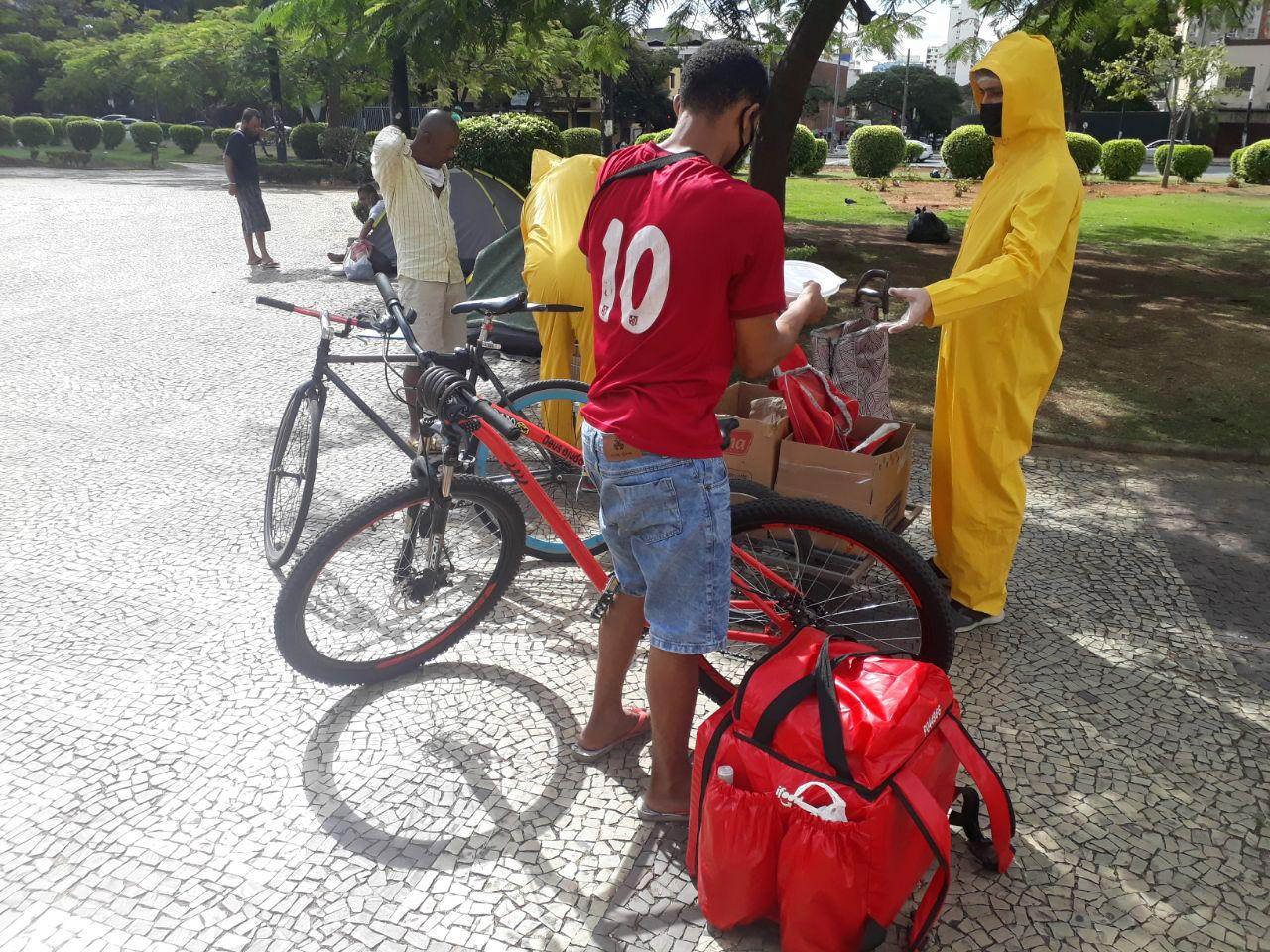
An Occupied Social Center Becomes a Hub of Mutual Aid in Belo Horizonte, Brazil
cross-posted from CrimethInc.
The Zapatistas have said the best solidarity anyone can offer is to start their own social centers, projects, movements, and revolutions wherever they are based. In Belo Horizonte, the capital city of the state of Minas Gerais in southeastern Brazil, a collective called Kasa Invisível (Portuguese for “Invisible House”) has heeded that proposal, and hopes to inspire you to do the same.

The three formerly abandoned houses now occupied by this autonomous, anti-capitalist collective serve as a home for people in need, a social and cultural center for the community, and a meeting and organizing space for anti-authoritarian resistance and mutual aid. While there are hundreds of building and land occupations in Minas Gerais alone, Kasa is one of only a few squats in the region that explicitly exist to support struggles against the state and capitalism. As they refocus their efforts to meet their neighbors’ needs during the COVID-19 pandemic, the collective maintains a consistent relationship of mutual aid with the surrounding community, both giving support to and receiving support from those who live and work there. While they aim to be a reference and inspiration for similar projects throughout Brazil for a long time to come, recent circumstances have put the future of their occupation in question, prompting them to call for solidarity from the international community to keep this vital center of resistance active.
Since 2013, the collective has occupied three houses in the center of the city, using two as living spaces and keeping the third open to the community as a free space for meetings, workshops, movie screenings, study groups, debates, fundraisers, and other social and cultural events. The squat houses a free library, cinema, and urban garden, and offers space for movements, collectives, and unions that do not have their own headquarters to hold internal meetings or open events.

The project began when a handful of anarchist political organizers formed an affinity group. Most of them knew each other from participating in other social centers such as Loja Grátis (Free Shop) and Ocupação Guarani Kaiowá, as well as groups like the Passe Livre Movement, which advocates for free urban transportation.
Z, who has lived in the squat since the group first occupied the property, says the idea of creating a social center that would function as a home, a cultural center, and a structure for anti-capitalist political organization had long been an ambition they shared. “Since the beginning, the purpose of the occupation is to be a space that supports your community,” he says. “Housing is important, but occupied spaces are much more alive when they become social centers, which can feed and be fed by the community.”
After researching empty houses in the city, they discovered a house in downtown Belo Horizonte that had sat abandoned for more than 20 years. Built in 1938, the two-story art deco house had previously been a restaurant—and before that, the home of a wealthy family. The group set about making the place habitable: cleaning, removing debris, rebuilding the floors, painting the walls, putting in new pipes for the water and electrical systems. They held fundraising events to pay for these repairs, all of which they performed themselves in weekly work parties. After three years of hard work to make the house safe to welcome guests], they finally opened to the community on November 27, 2016 with a street festival they called the Okupa Skina Fair
There are currently more than 6 million abandoned properties in Brazil, a country where the housing deficit is estimated at 7 million units and 20 percent of the population lives in inadequate housing. Kasa Invisível’s desire to call attention to this disproportion is represented in the collective’s name. “It has a lot to do with abandoned properties being invisible spaces, as well as people with no place to live,” Z explains. “Other people pass by both on the streets as if they were lifeless objects. And they only become visible when we decide to take direct action and show that there is no reason to have empty houses while there are people without a home.”
Brazil’s urban squatter movement emerged in the late twentieth century as a response to its deeply entrenched homelessness crisis. This issue, however, can be traced back to the colonial era, when access to land was restricted to wealthy citizens who received land grants from the Portuguese Crown. After Brazil gained independence from Portugal in 1822, the government’s new land policies severely limited poorer citizens’ access to land, particularly immigrants and freed slaves of African descent. Today, almost half of the land in Brazil is owned by 1 percent of the population, a grouping that includes families descended from Portuguese nobility. Initiatives such as the Rural Landless Workers Movement, which has approximately 1.5 million members, have risen up to reform this unequal distribution by successfully occupying unused plots of land since the 1980s. These efforts inspired grassroots groups of homeless people in the country’s urban areas to begin systematically occupying vacant buildings, starting in Sao Paulo, Brazil’s largest city. Today, homeless organizations like these exist in at least 14 major cities across the country.
More recent history has seen Brazil’s economy enter its second worst recession ever, which began in mid-2014 as a result of failed macroeconomic policies and was exacerbated by corruption scandals and right-wing parliamentary maneuvers that paved the way for the impeachment and dismissal of former President Dilma Rousseff, a member of the social democratic Workers’ Party (PT). The ensuing economic crisis has since increased the country’s wealth gap by a continually widening margin that peaked in 2019, and fueled a general swell of anger and distrust of the government, and specifically the PT, among Brazilian voters. In 2018, reactionary populist candidate Jair Bolsonaro was elected president after a campaign in which he presented himself as a political outsider and appealed to the far right with racist, misogynist, and homophobic comments and rhetoric in favor of the military dictatorship that ruled Brazil from 1964 to 1985. Dubbed the “Trump of the Tropics” by the Brazilian media, Bolsonaro has promised to “cleanse” the country of leftists.
Because solidarity is so important in this economic and political climate, Kasa and other urban occupations, such as Casa da Resistência in Bahia, Brazil, act as an informal network of support for one other. “We have several squats in our town, mostly buildings with many floors and dozens—or hundreds—of families,” says Z. “We try to keep in touch and build mutual support, especially with the small squats, houses like ours, where people have less connections and many needs.”
Under the current circumstances, in which social distancing is necessary to stay safe from COVID-19 infection, Kasa’s role as a home for people in precarious economic situations has become its most crucial function. The squat currently houses six families, ranging from young children to middle-aged women and men. The collective also includes people who don’t live in the house; before the pandemic, some were able to operate self-managed cooperative businesses there, enabling them to be more self-sufficient.
“One of our first intentions has always been to create a safe space for collectives that don’t have their own place to come together,” says L, who joined Kasa Invisível in 2016 after she met several members while working with the Passe Livre Movement. “Often, these collectives met in public spaces, or in spaces managed by the city, and both have their flaws on security and bureaucracies.” Before the pandemic, other collectives frequently used Kasa’s space for closed meetings and open events, many of which L says they wouldn’t be able to hold in other places that require payment or don’t have the necessary structure. “Another need that we certainly meet is that of a meeting place for people with libertarian and anarchist ideals,” she says. “Often people who felt alone with certain thoughts or studies find Kasa to find others who think alike, and are strengthened as a community.”
In addition to serving the community as a meeting and event space, Kasa has housed a community kitchen, a screen-printing workshop, and a vegan food cooperative. In the early days of the occupation, the collective operated a Free Store in the house and on the sidewalk, gathering clothes, tools, books and other materials to share freely. “This allowed us to meet and support many people, especially homeless people in our neighborhood, who were the main users,” says Z.
Having already established solid relationships with their neighbors, the people at Kasa Invisível have been uniquely prepared to respond to the needs of the most vulnerable in their community during the current global crisis. “Even before the pandemic, we already walked through the streets around the squat, and we already talked to the people on the streets,” says L. “We are able to maintain a dialogue that allows us to organize our action based on the real necessities of the people.”
Brazil’s count of confirmed COVID-19 cases has now passed three million, with more than 100,000 deaths. As of this month, Brazil has the third highest number of confirmed COVID-19 cases in the world. In spite of this, Bolsonaro has continually opposed quarantine measures such as closing businesses and restricting public transportation, claiming they would hurt the national economy, and has downplayed the danger posed by the virus, dismissing the warnings of health experts and the media as “hysteria” and fantasy.” In June, Brazil’s Ministry of Health took down a website showing the country’s total numbers of COVID-19 infections and related deaths and began to only publish numbers for the previous 24 hours. Three days later, the Supreme Court ordered the ministry to resume reporting the cumulative figures, following accusations of data manipulation and censorship. Even when Bolsonaro announced in July that he had tested positive for the virus, he continued to defend his stance against isolation measures.
Despite the federal government’s attempts to obfuscate the impacts of coronavirus, L says the substantial number of deaths has caused an inescapable feeling of grief among the people of Brazil. “And they can’t even process this in a healthy way, because they have to worry about money, rent, what they are going to eat, and how they will be able to protect themselves from the virus, knowing they can’t afford to stop working, stop taking the crowded buses. The impact of this on the mental health of the general population is immeasurable.”
While adapting to the pandemic has meant Kasa Invisível can no longer host meetings in the occupation and has suspended all events for the foreseeable future, in other ways, the situation has made their function as a hub of support for the community more meaningful than ever. “In Belo Horizonte, we saw the population who live on the streets increase,” says L. “This is visible for anyone who gets out of their house.” In March, they started a campaign, inspired by the campaigns organized by other collectives in countries like Chile and the US, to support the area’s homeless population, having seen that they were among those most affected by the crisis. They began to collect donations of money and materials including food, clothing, masks, and hygiene products to produce kits, which they distribute to their homeless neighbors and other occupations in the neighborhood on a weekly basis.


“All of this fits together and only deepens the proposal that we have brought from the beginning, which is to use the house as a tool for the community,” says Z. He believes these direct actions have made more people aware not only of the collective’s presence in the neighborhood, but of why they are there. “Many people already knew Kasa Invisível, but not all people noticed all the fronts on which we operate. Some thought it was just a cultural or music place where you can go for free. It was great to see the response of new people knowing about the space for the first time due to the campaign, and others realizing that Kasa is much more than a place for gathering, but also a tool of action in our territory.”
Throughout this crisis, the collective itself has also benefited from solidarity with the surrounding community. “The relationship with the people who attend and support Kasa, in addition to other movements, was also fundamental,” says Z. “Not least because all residents were unable to work, and mutual support was essential for us to have something to eat too.” More recently, this solidarity has become particularly crucial as they contend with specific challenges to their occupation of these three houses.
Kasa Invisível has been threatened with eviction since a judge authorized the “repossession” of the house on March 18, 2020 and the court denied the collective’s request for a suspension of the decision. “Without the support of lawyers and a collective of UFMG [state university] jurists in solidarity with the space, we would be in a complicated situation,” says Z. The online petition they have organized, which has now collected more than half its goal of 5000 signatures, calls on the Belo Horizonte City Hall to suspend the repossession of the Kasa and, for the duration of the current health crisis, prohibit all evictions of those in similarly precarious housing situations throughout the city.
In July, the collective put out a call for solidarity, asking for financial and material support to keep the houses safe and habitable for the occupants, and their doors open as a free space for the community in the future. The region’s intense rainy season has caused flooding throughout southeastern Brazil; as Z has pointed out, squatting means being responsible for managing and repairing one’s own living space. To prepare for the next rainy season, they need to fix Kasa’s roof and gutters, which were severely damaged by the last rains in addition to the deterioration the house suffered during its two decades of abandonment; they also have to improve the electricity and pipes, repair floors and walls, and expand doors and hallways for accessibility. So far, they have been able to raise 30% of the full amount (US $6000) needed for materials, labor, and transportation costs.
Comrades in North America:
Our dear friends from @lobeliacommons in New Orleans made posters and t-shirts for our campaign to keep our #squat alive and active.
Please share, order some of our art crafted by those talented folks and spread #solidarity.https://t.co/e77yLNeV98 pic.twitter.com/zScxYyjyyo
— Kasa Invisivel (@kasainvisivel) September 1, 2020
Z believes that establishing a comprehensive relationship with the surrounding community, not limited to specific groups or scenes, has been fundamental both to making an impact and to generating the support that sustains the initiative. For people who want to start similar projects, he stresses how important it is to demonstrate anarchist principles, rather than simply talk about them. “Disseminating messages and theories is very important, but proposing actions and putting them into practice is even more important for us to be taken seriously.”
Because they know this kind of work can only change the world if other people and groups replicate it wherever they are, the collective members continue to hope their campaigns will inspire similar efforts, as they’ve been inspired by campaigns in other parts of the world. “I think I speak for everyone when I say that one of our big dreams is that spaces like Kasa Invisível multiply everywhere in Brazil, especially in those places that lack spaces like that,” says L. “May it serve as inspiration and proof that this is possible to occupy an abandoned house, or many together. It is possible to maintain it from a horizontal management, without the help of companies or state apparatus.”
Previous articles in this series have explored whether or not mutual aid should always be political, particularly in times of crisis such as a global pandemic. Asked if he considers the work of Kasa Invisível to be political, Z says, “If being political is a broad relationship of action and social transformation, yes, certainly. The relationship between direct actions of mutual aid or other forms of organization and a radical vision of social transformation is not always obvious, because even bourgeois charities can do actions that look very similar to ours. It is in the organizing, in long-term visions and in daily practice, that we will design and make obvious the relationship of emergency or spontaneous actions with revolutionary practice and visions.”
To Know More and Support Kasa Invisível
-
You can donate to Kasa Invisível via PayPal: kasainvisivel@gmail.com
-
Or visit abre.ai/kasainvisivel.
-
Comrades in the US have produced shirts and posters to support Kasa Invisível.
-
You can sign a petition against the eviction here.
-
You can read more about the support campaign for Kasa Invisível here.
-
Read more about Kasa Invisível here and on its social media.
-
Squatting activism in Brazil and Spain: Articulations between the right to housing and the right to the city - Article about squatting in Belo Horizonte and Spain (6th chapter of the book).


Add new comment